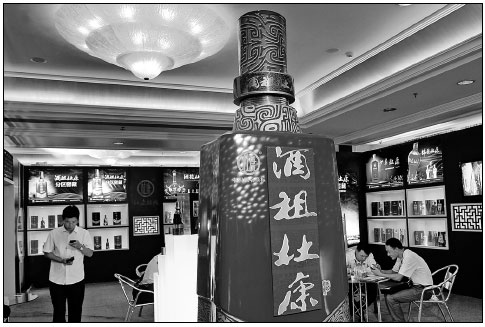Rivals continue long-standing legal wrangle over historic trademark
Trademark disputes have long caused headaches for many of China's famous brands, costing much time and money, and further solutions need to be made to improve recognition and protection for those brands, experts said.
Earlier this month, baijiu producer Luoyang Dukang, based in the Henan provincial capital Luoyang, filed a complaint against its rival Baishui Dukang, headquartered in Shaanxi province, with the Tianjin High People's Court claiming the latter violated its trademark rights.
Baijiu is a grain-based liquor which has been produced in China since ancient times.
Since 2016, the two Chinese liquor brands have been entangled in numerous legal cases involving trademark infringement and unfair competition, with victories and loses claimed on both sides.
In February, the Tianjin No 1 Intermediate People's Court dismissed the earlier claims of Luoyang Dukang, saying that it has no evidence to show that Baishui Dukang copied its trademark on purpose or tried to profit from its fame.
Luoyang Dukang lodged an appeal with the Tianjin High People's Court, which heard the case on May 9.
Centering on the trademark "Dukang", the name of legendary inventor of baijiu in Chinese history, the Henan High People's Court ruled in favor of Luoyang Dukang, ordering Baishui Dukang to pay compensation of up to 15 million yuan ($2.35 million) and stop producing related liquor products in April.
The court said Baishui underlines the words Dukang to catch the attention of customers and that may cause confusion and misunderstanding between the two products.
"The problem can be traced back to the long history of Dukang liquor," Xiong Chao, director of the trademark department of Jingsh Law Firm, told Workers Daily.
Three companies have shared the use of the Dukang brand dating back to the 1970s when trademark law was yet to be established in China. The first of the disputes was raised in 1981 and have shown little signs of abating since.
Other traditional Chinese brands are also the subject of other disputes and quarrels between rival companies.
China's two leading brands of herbal tea, Jiaduobao and Wong Lo Kat, were in a five-year legal battle over the rights to a specific packaging design since 2010.
In 2017, the supreme court ruled that the two could both use the same packaging, as long as they do not harm each other's interests, saying both companies "make contributions to promoting the packaging and related products".
Zhao Zhanling, deputy director of intellectual property and legal services organization Zhilin Law Group, said that market authorities in different cities didn't share information when giving approvals for business names, nor check that the name had been registered as a trademark, which to some extent has also led to disputes.
Some companies may even use lawsuits as a means to expand media exposure, overpower their competitors or intervene in the process of going listed, Zhao said. "But the scramble for trademarks is the most significant reason."
Yin Hong, deputy director-general of the department of circulation industry development at the Ministry of Commerce, said the central government is thinking about releasing recognition, management and protection methods for time-honored brands.
Zhao Hu, an intellectual property attorney for law firm Zhongwen, said companies can try the trademark sharing model, but need something different for customers to tell one from the other.
|
Luoyang Dukang displays its products at a hotel in Wuhan, Hubei province. Due to a trademark dispute over Dukang, the name of legendary inventor of baijiu in Chinese history, the liquor maker has been involved in a series of legal cases. Provided to China Daily |
(China Daily 05/24/2018 page17)















